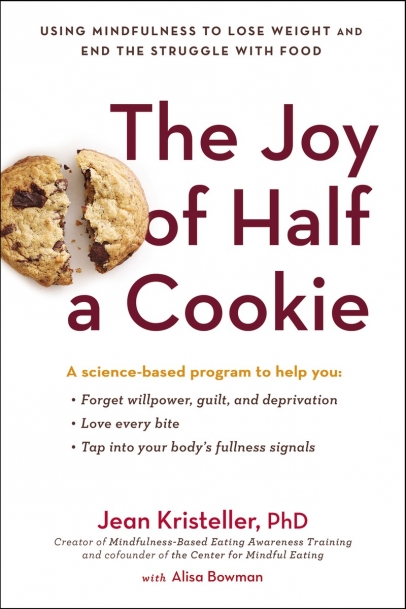Good Reads for the New Year :The Joy of Half a Cookie
Food is part of our life and part of our culture, and need not be made the enemy. Yet choosing what we eat is also complex, entailing many decisions every day. A groundbreaking, practical guide, The Joy of Half a Cookie presents the science and practice of mindful eating based on a renowned and well-researched program funded by the National Institutes of Health. Oftentimes you hear “I was doing great until I went home for the holidays!” or “I was on track until my parents came to visit!” By exploring the elements of enough, readers will know when and how to stop overeating, explore the appreciation of taste and how to savor flavors, and gain mastery over tempting foods and triggers. Rather than struggle with deprivation and denial associated with food, Kristeller and Bowman can provide strategies for anticipating challenging situations and help you implement a mindfulness practice to tackle them so you can have your pumpkin pie, and eat it too, without the guilt this holiday season!
Enjoy this excerpt from The Joy of Half a Cookie: Using Mindfulness to Lose Weight and End the Struggle with Food.
“I’ve Blown It” and Other Thoughts That Get Us into Trouble
In the previous chapter, you learned of several types of thoughts that help us justify that first bite. Many other thoughts can also justify eating out of control and are therefore pretty self-defeating. Sometimes these are referred to as “distorted thinking”: patterns of thoughts that become habits, but are not really accurate, nor particularly helpful. Let’s explore some of the most common ones in relation to eating.
I have to clean my plate! Nearly all of us have said this to ourselves at some point. At the same time, this kind of mindless thinking isn’t logical. There’s no relationship between how much you eat and whether children somewhere else in the world are starving. And if you are eating food you don’t enjoy and energy your body doesn’t need, then you’re still wasting food. It would be much less of a waste to set aside what you can’t finish now so you can enjoy it later, when your taste buds are fresh and you are hungry again. Consider this: As you gradually reduce how much you (and perhaps your family) are eating, you can also reduce your grocery bills. And you can consider contributing the difference to a charity that really will help feed others who desperately need the food.
I’ve blown it! What’s the “I’ve Blown It” effect? It’s when your negative, controlling inner parent (“You shouldn’t have it”) is bouncing off your willful inner child (“But I want it”). Eventually, you end up with “I’ve blown it” followed by “I might as well keep going,” “Screw it,” “Here I go again,” or something similar. The “I’ve Blown It” effect, as I phrase it, was first identified back in the 1970s by Alan Marlatt, the late director of the Addictive Behaviors Research Center at the University of Washington, whose more technical term for it was the abstinence violation effect. He found that recovering addicts who considered a single slip up, such as smoking one cigarette or of drinking one beer, as evidence of their innate lack of willpower were more likely to completely relapse than those who saw it for what it was: Just one slip up.This is also true with food. Scientists have been studying such patterns in food intake for some time, showing that chronic dieters are also susceptible to the “I’ve Blown It” effect. One study started off by asking participants to consume zero, one, or two large milkshakes, and then offered them different flavors of ice cream to taste. Nondieters ate progressively less ice cream as the milkshakes got larger. The good news was that dieters also ate less after the very large, 30-ounce shake, but ate more ice cream after the 16-ounce shake. This suggests that while dieters, at least those in this study, could be responsive to very high levels of satiety, they would stray from their diet intentions when the violation was more moderate.
If you tell yourself that you’ve blown it, then you’ll probably go on to do just that. If, on the other hand, you keep a balanced sense of perspective and tell yourself “Oh, well, maybe I ate too much, but next time I’ll be more mindful,” then you’ll understand that there’s no such thing as “blowing it.” Right now, it might feel as if you go from “I want to eat that” to “I’ve blown it” as just one part of an uncontrollable cycle or chain reaction. With mindfulness, you can stop the chain reaction at any point. Every moment is an opportunity to be mindfully aware of your ability to stop, pause, and head in a different direction.
I want to get my money’s worth! This one often comes up at an all-you-can-eat buffet and when we’re served bottomless beverages, fries, and other dishes. Even after eating to an uncomfortable point of fullness, you might think, “I’m going to make one more trip so I can get my money’s worth.” This is irrational because you pay the same amount for the meal, no matter how much you eat. End result, you gain weight on the scale, but your bank balance remains pretty much the same.
Mindfulness doesn’t mean that you push these thoughts out of your mind (you probably wouldn’t be able to at first) or never follow what your thoughts suggest. It’s about paying attention to them and making conscious, rather than automatic choices, by responding rather than reacting. You’ll be able to see these thoughts as “just thoughts”, rather than inner commands. For instance, if you’re eating out and the dessert cart comes by, you’ll consider: Is there one offered that you will really enjoy? How full are you already? If you continue to eat, how will it affect your day’s food balance? Perhaps you’re not that full, you’ve eaten lightly earlier in the day, and the dessert is one of your favorites—so let yourself enjoy! But if the opposite is true, you have the power to decide to let it go.
By considering such questions, you’ll be able to arrive at a firm, guilt-free decision to continue to eat or not to, and you’ll be aware of the decisions you are making. Your eating will become a conscious choice, and you’ll be able to enjoy the experience even as you are losing weight.
About the Authors:
Jean Kristeller is a professor emerita of psychology at Indiana State University and the creator of the NIH-funded Mindfulness-Based Eating Awareness Training (MB-EAT). Her work has been featured in Self, Redbook, NPR’s The Salt, The Boston Globe, and The Baltimore Sun among many others.
Alisa Bowman is a professional writer who has penned numerous bestselling books and written for Family Circle, Prevention, AARP, Parents, and many other national magazines.
The book is available after December 29, 2015 where fine books are sold.







